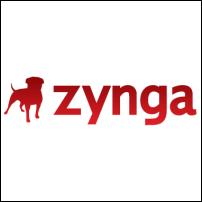With continued speculation over a social media bubble, we are taking a look at the creator of Farmville and acquirer of OMGPOP (developer of Draw Something) for $200 million. Zynga (NYSE: ZNGA), held by Chase Coleman, has been growing like a weed and has plans to launch its own gaming platform and enter online gambling market. ZNGA publishes games on social media networks, notably Facebook. While in the past ZNGA’s revenue has mostly come from Facebook, its future growth will need to be just as strong on other platforms, including smart phones, tablets and its own website if it is to remain competitive.
ZNGA dominates gaming on Facebook, has a solid balance sheet, and has room to grow in the mobile space, but from a valuation standpoint may have already factored those points in. It owns five of the top ten Facebook games, and its total Daily Average Users (DAUs) is almost five times more than that of competitor, Electronic Arts (NASDAQ: EA). Note that the business models vary as ZNGA does not hold an inventory. ZNGA generated over $1 billion of revenue in 2011—not too shabby for a company that started five years ago. We think ZNGA will continue to be reliant on Facebook for future growth, meaning that if Facebook’s subscriber growth slows, it may negatively impact ZNGA’s users and user growth. And while we think Facebook will continue to add users, we do think the growth rate will slow. For your reference, Facebook has approximately 850 million users worldwide though it is important to remember that not every Facebook user plays games while logged on. What is undeniable is that the company is very good at creating a steady stream of popular games and monetizing them. Farmville, Zynga Poker, and Mafia Wars have all generated cumulative revenues of $300 million and five other games generate revenues of over $100 million each in 2011. ZNGA’s top five games are CityVille, Texas Hold ‘Em, Hidden Chronicles, Farmville, and Castleville.
The market opportunity is huge with an estimated one to two billion people that play interactive games on digital devices. Increasingly, due to affordability and portability, the gaming medium is shifting to tablets and smart phones, where ZNGA’s leadership is uncertain (read more on The Problem of Mobility). ZNGA has applied laser-like focus to a single platform (Facebook) and thus has not established a foothold in the mobile market. Technology-savvy people point out that the iOS ecosystem is relatively straightforward to use but that the market for Android-based devices, is not as standardized, so publishers will need to understand the nuances of different manufacturers and marketplaces. Also, not all of the tools that made ZNGA successful on Facebook like viral notifications are available to the same degree on mobile platforms.
From a financial perspective, with almost $2.0 billion in cash and equivalent at year-end 2011 and probably close to $300 million in free cash flow by 2013, ZNGA is building up a nice store of cash that can be deployed to launch new platforms, build its own platform, and continue its acquisition spree. Last year, ZNGA saw large declines in its DAU growth and Monthly Average User (MAU) growth: 2% in DAUs compared to 37% growth in 2010 and 7% in MAUs compared to 42% growth in 2010. That sharp drop is not a good sign. Another metric we scrutinize is Average Bookings Per User (ABPU), which measures the amount of money the average user pays per day factoring in Facebook’s 30% cut. In the fourth quarter, ZNGA’s ABPU was $0.061, which translates to the average player paying six cents per day. Whether or not ZNGA can grow ABPU meaningfully remains to be seen. It either needs to get players to pay more or convert more non-paying players to paying players.
An exciting project currently being developed is Project Z. Our understanding is that ZNGA is developing its own website (zynga.com) through which it is beta-testing a feature that allows gamers access to games but not through Facebook. If successful, this initiative will reduce dependence on Facebook. What ZNGA does have in its favor is its 200 million user base that the company can directly promote to.
From a valuation standpoint, we compare ZNGA to both gaming development companies and a zero-inventory internet companies. It trades at 33.0x 2013E earnings, which is higher than Opentable (NASDAQ: OPEN) that trades at 21.0x, higher than Groupon (NASDAQ: GRPN) that trades at 22.0x, but less than the fast-growing Zipcar (NASDAQ: ZIP) that trades at 40.0x, and LinkedIn (NYSE: LNKD) that trades at 86.0x. Digital gaming companies tend to have multiples above inventory holders like EA, but ZNGA’s multiple is higher than a lot of those companies as well, leaving us wondering just how much more upside there is. We also share many investors’ concerns over the end of the insider share lock-up period this May, which couple with the planned secondary offerings may add 660 million shares to those already outstanding. Granted, this is a short-term concern but we see a real possibility for downward pressure on the stock price.
